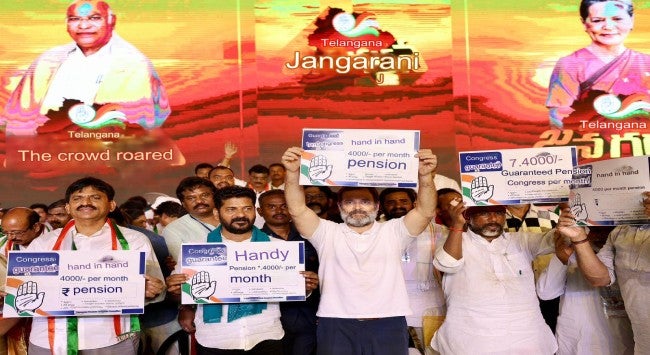Summary
Reviving the old pension scheme for government employees is shaping up as a major electoral promise of the opposition parties in India. If the ruling National Democratic Alliance government is driven to similar assurances, then electoral politics will consume much hard-earned fiscal consolidation.
With the next general elections little more than six months away, the electoral agendas of political parties are getting shaped in ‘vote-catching’ fashions. Economic promises are high on the agendas. Among these, reviving the old pension scheme (OPS) for government employees is emerging as a significant commitment from the opposition parties.
The OPS, which was operational since the 1950s, was replaced by the new pension scheme (NPS) on 1 January 2004. The two schemes are significantly different. The OPS was confined to only government employees. The second, while applying to government employees, can also be availed by non-government private sector employees. The most fundamental difference between the two, however, is in the nature of pension benefits.
The beneficiaries of the OPS, upon retirement, begin receiving half of their last monthly salaries as pension, topped up by a dearness allowance (an additional allowance for offsetting inflation), for the rest of their lives. The OPS did not require any employee contribution and the pension liabilities were entirely borne by the government. In contrast, the NPS, which applies to employees joining the government on or after 1 January 2004, requires them to contribute 10 per cent of their basic salaries towards pension. The contributions are matched by the employers (both government and non-government). The beneficiaries of the NPS can obtain more income by investing part of their savings in market-linked pension funds. Upon retirement, they can pick up 60 per cent of their accumulated savings as a lump sum, while earning fixed annualised income (annuities) on the remaining 40 per cent.
In India’s current political climate, government jobs feature high among electoral promises. The popular appeal of government jobs is enhanced by heir pension benefits. The OPS is finding more traction in this regard due to its features of assured monthly income and zero employee contribution.
There is nothing new that the political parties can promise the electorate on jobs. Their sway is limited to government jobs. Even here, promising new government jobs holds little appeal as such promises have proven hollow in the past. The scope of reserving jobs for specific groups is nearing saturation with, previous quotas leaving hardly any space for new reservations. The electoral strategy on government jobs, therefore, has begun focusing on pensions.
After the central government introduced the NPS, state governments also adopted it subsequently. In the recent past, five opposition-ruled states – Chhattisgarh, Himachal Pradesh, Jharkhand, Punjab and Rajasthan – have discarded the NPS in favour of the OPS. West Bengal – a major opposition-ruled state – had never adopted the NPS. Other prominent opposition-ruled states like Tamil Nadu, Karnataka and Kerala are yet to give up the NPS. Nonetheless, the possibility of the OPS being pitched as a major sop by India’s opposition parties in the forthcoming general elections is very strong. This is evident from the support extended by the opposition parties, including the Congress and the Aam Aadmi Party, to the lobby of government employees demanding restoration of the OPS.
The NPS was introduced by the Bharatiya Janata Party (BJP)-led National Democratic Alliance (NDA) government headed by Prime Minister Atal Bihari Vajpayee. None of the later governments, be it the Congress-led United Progressive Alliance (UPA) headed by then Prime Minister Dr Manmohan Singh, or the current BJP-led NDA under Prime Minister Narendra Modi, attempted to give up the NPS for the OPS.
From the perspective of government finances, the OPS represents much greater committed budgetary liabilities. With fiscal discipline being a core objective of India’s macroeconomic management, both the UPA and NDA governments have refrained from digging deeper fiscal holes. Taking on more liabilities through pensions has been studiously avoided, given that committed government expenditures have kept on increasing through larger budgetary outlays on various welfare schemes.
With the elections drawing close, and the demand for reviving the OPS drawing wider support, it will be a challenge for the ruling NDA government to counter the political appeal of reviving the OPS. It might be forced to make the same commitment or pledge something equally appealing. Either way, the obvious and unfortunate casualties of the political contestation will be India’s central and state government finances. It will, indeed, be a shame if politics wipes away the fiscal discipline secured over the last two decades since the introduction of the NPS.
. . . . .
Dr Amitendu Palit is a Senior Research Fellow and Research Lead (Trade and Economics) at the Institute of South Asian Studies (ISAS), an autonomous research institute at the National University of Singapore (NUS). He can be contacted at isasap@nus.edu.sg. The author bears full responsibility for the facts cited and opinions expressed in this paper.
Pic Credit: INCIndia’ Twitter Account.
-
 More From :
More From :
-
 Tags :
Tags :
-
 Download PDF
Download PDF



